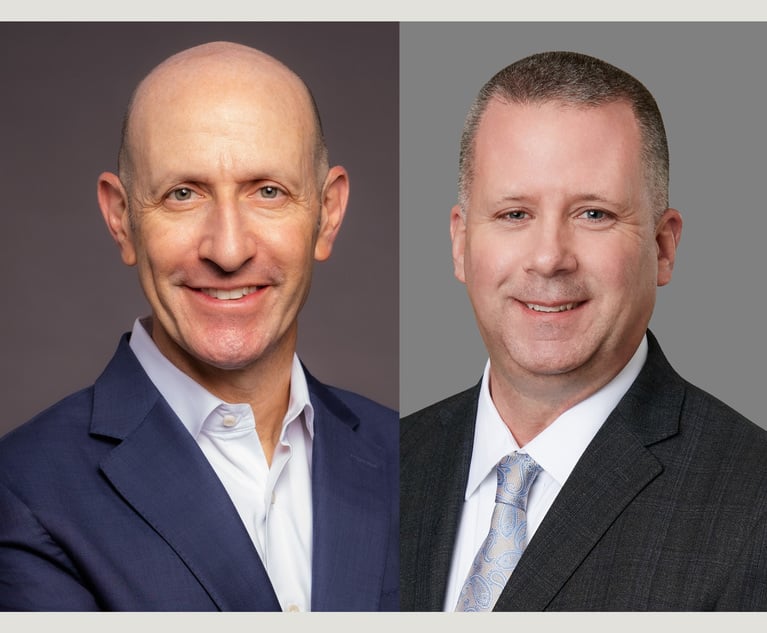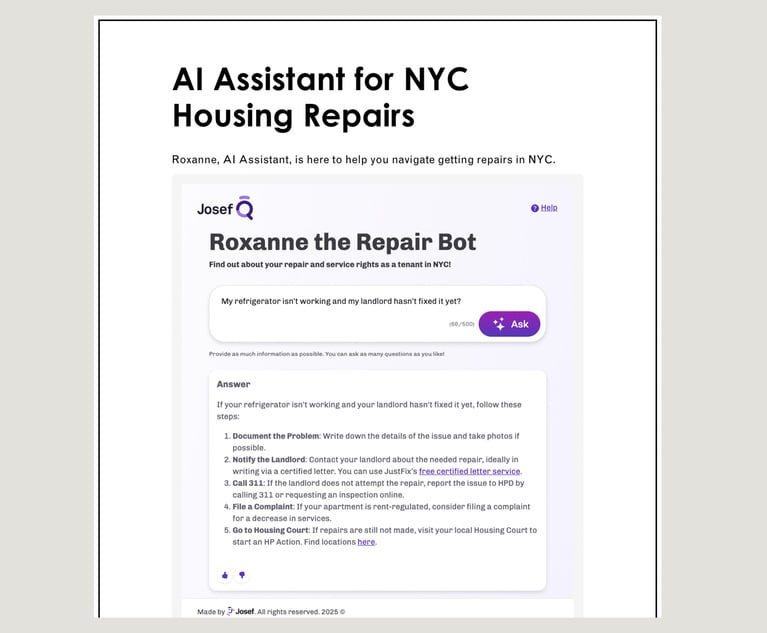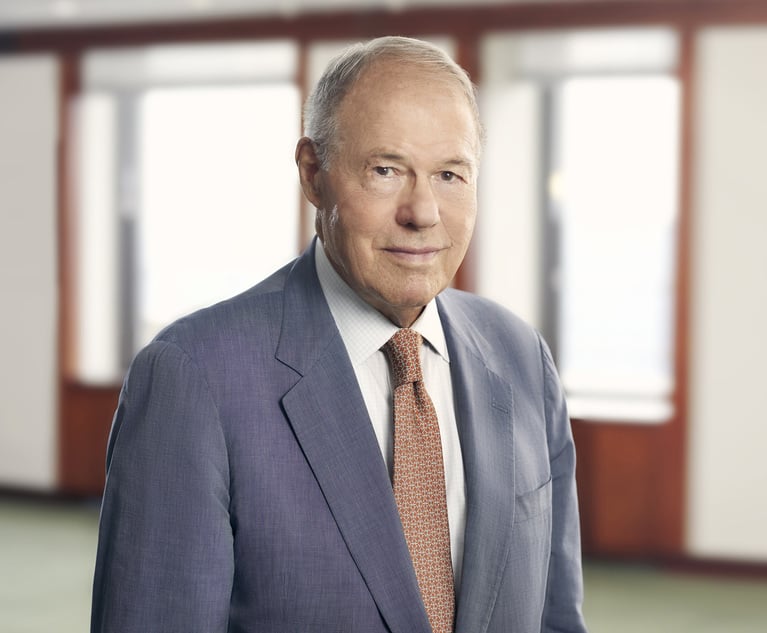 Kerry Anderson, partner with O'Neal Webster
Kerry Anderson, partner with O'Neal WebsterBritish Virgin Islands Firm O'Neal Webster Opens New York Office
The opening may portend broader and more direct engagement of offshore firms with onshore clients.
November 16, 2018 at 09:41 AM
3 minute read
The original version of this story was published on The American Lawyer
As competition among offshore law firms continues to intensify, British Virgin Islands-based O'Neal Webster has opened a New York City office—a rare step for an offshore firm.
The large, long-dominant players in the BVI—Harneys, Appleby, and Conyers Dill & Pearman—have global networks and may dispatch lawyers to meet and greet clients in the Big Apple, but none of them has an official branch anywhere in the U.S.
For the moment, O'Neal Webster's New York outpost consists of a single partner, Kerry Anderson, who heads the firm's investment funds and regulatory practices. While based in New York, Anderson will advise a global array of companies and funds on BVI law (but not on New York law) related to such matters as mergers and acquisitions, investments, trusts and estates, and restructurings. Anderson said he expects to add staff soon as the firm's business grows.
While opening a New York office may be an unusual step for a BVI firm, Anderson said it is entirely logical for the head of a funds practice to be based in the city, given the sheer number of funds that find sponsors, launch and make use of legal services in New York.
“With roughly 75 percent of all hedge funds set up in New York, if you want to be able to increase your market share in the hedge fund space, it makes sense to be here,” Anderson said, adding that O'Neal Webster is a member of the global Lex Mundi law firm network, many of whose member firms have a presence in Manhattan and throughout the U.S.
Still, Anderson acknowledges that opening a New York office is an unusual move in the BVI, where many firms are part of networks with offices in Hong Kong, Singapore, London and the Cayman Islands.
“We wanted to try something different and see where it leads. Now we can have more face-to-face meetings, hold seminars, leverage our network, and provide more comprehensive services,” he said.
Part of Anderson's role in his new outpost will be educational in nature. Raising the BVI's profile and luring people to do deals with a BVI component means promoting understanding about what the jurisdiction does and does not offer. Certain misconceptions are fairly common among those who have not yet done deals in the BVI. For example, Anderson noted that some people believe that parking money in the BVI and making use of fund structures there is a way to avoid paying any taxes on transactions.
“We have to explain that it doesn't actually work that way. If you are a U.S. taxpayer, you pay taxes in the U.S. no matter where you put your funds,” he said.
At the same time, he noted that there are many benefits to doing deals in the BVI and some of these are not as widely understood as they could be. Thanks to the BVI's new (2017) Limited Partnership Act, for example, it is easy to form a company that has a separate legal personality while maintaining the pass-through character of a partnership. On a broader level, the BVI government has a marked business-friendly orientation.
“For years, the government of the BVI has partnered with the private funds industry, making regular amendments to regulations to keep up with client demand and to anticipate what BVI products they may be looking for,” Anderson said.
This content has been archived. It is available through our partners, LexisNexis® and Bloomberg Law.
To view this content, please continue to their sites.
Not a Lexis Subscriber?
Subscribe Now
Not a Bloomberg Law Subscriber?
Subscribe Now
NOT FOR REPRINT
© 2025 ALM Global, LLC, All Rights Reserved. Request academic re-use from www.copyright.com. All other uses, submit a request to [email protected]. For more information visit Asset & Logo Licensing.
You Might Like
View All
Meet the Long Island Judge Tapped to Be US Attorney for Eastern District of New York
2 minute read
New York’s Property Tax Incentives and Abatements Make Development Feasible
7 minute read
Josef Partners With NYU, Housing Court Answers to Launch AI Assistant Built for Tenants

Trending Stories
- 1The Appropriate Exemption in Students for Fair Admissions v. President & Fellows of Harvard College
- 2DOJ, 10 State AGs File Amended Antitrust Complaint Against RealPage and Big Landlords
- 3New Partners at Cummings & Lockwood, Carmody Torrance Sandak & Hennessey
- 4'Extra Government'?: NY Top Court Eyes Ethics Commission's Constitutionality
- 5South Texas College of Law Houston Selects New Dean
Who Got The Work
Michael G. Bongiorno, Andrew Scott Dulberg and Elizabeth E. Driscoll from Wilmer Cutler Pickering Hale and Dorr have stepped in to represent Symbotic Inc., an A.I.-enabled technology platform that focuses on increasing supply chain efficiency, and other defendants in a pending shareholder derivative lawsuit. The case, filed Oct. 2 in Massachusetts District Court by the Brown Law Firm on behalf of Stephen Austen, accuses certain officers and directors of misleading investors in regard to Symbotic's potential for margin growth by failing to disclose that the company was not equipped to timely deploy its systems or manage expenses through project delays. The case, assigned to U.S. District Judge Nathaniel M. Gorton, is 1:24-cv-12522, Austen v. Cohen et al.
Who Got The Work
Edmund Polubinski and Marie Killmond of Davis Polk & Wardwell have entered appearances for data platform software development company MongoDB and other defendants in a pending shareholder derivative lawsuit. The action, filed Oct. 7 in New York Southern District Court by the Brown Law Firm, accuses the company's directors and/or officers of falsely expressing confidence in the company’s restructuring of its sales incentive plan and downplaying the severity of decreases in its upfront commitments. The case is 1:24-cv-07594, Roy v. Ittycheria et al.
Who Got The Work
Amy O. Bruchs and Kurt F. Ellison of Michael Best & Friedrich have entered appearances for Epic Systems Corp. in a pending employment discrimination lawsuit. The suit was filed Sept. 7 in Wisconsin Western District Court by Levine Eisberner LLC and Siri & Glimstad on behalf of a project manager who claims that he was wrongfully terminated after applying for a religious exemption to the defendant's COVID-19 vaccine mandate. The case, assigned to U.S. Magistrate Judge Anita Marie Boor, is 3:24-cv-00630, Secker, Nathan v. Epic Systems Corporation.
Who Got The Work
David X. Sullivan, Thomas J. Finn and Gregory A. Hall from McCarter & English have entered appearances for Sunrun Installation Services in a pending civil rights lawsuit. The complaint was filed Sept. 4 in Connecticut District Court by attorney Robert M. Berke on behalf of former employee George Edward Steins, who was arrested and charged with employing an unregistered home improvement salesperson. The complaint alleges that had Sunrun informed the Connecticut Department of Consumer Protection that the plaintiff's employment had ended in 2017 and that he no longer held Sunrun's home improvement contractor license, he would not have been hit with charges, which were dismissed in May 2024. The case, assigned to U.S. District Judge Jeffrey A. Meyer, is 3:24-cv-01423, Steins v. Sunrun, Inc. et al.
Who Got The Work
Greenberg Traurig shareholder Joshua L. Raskin has entered an appearance for boohoo.com UK Ltd. in a pending patent infringement lawsuit. The suit, filed Sept. 3 in Texas Eastern District Court by Rozier Hardt McDonough on behalf of Alto Dynamics, asserts five patents related to an online shopping platform. The case, assigned to U.S. District Judge Rodney Gilstrap, is 2:24-cv-00719, Alto Dynamics, LLC v. boohoo.com UK Limited.
Featured Firms
Law Offices of Gary Martin Hays & Associates, P.C.
(470) 294-1674
Law Offices of Mark E. Salomone
(857) 444-6468
Smith & Hassler
(713) 739-1250






